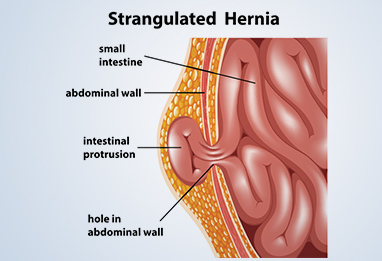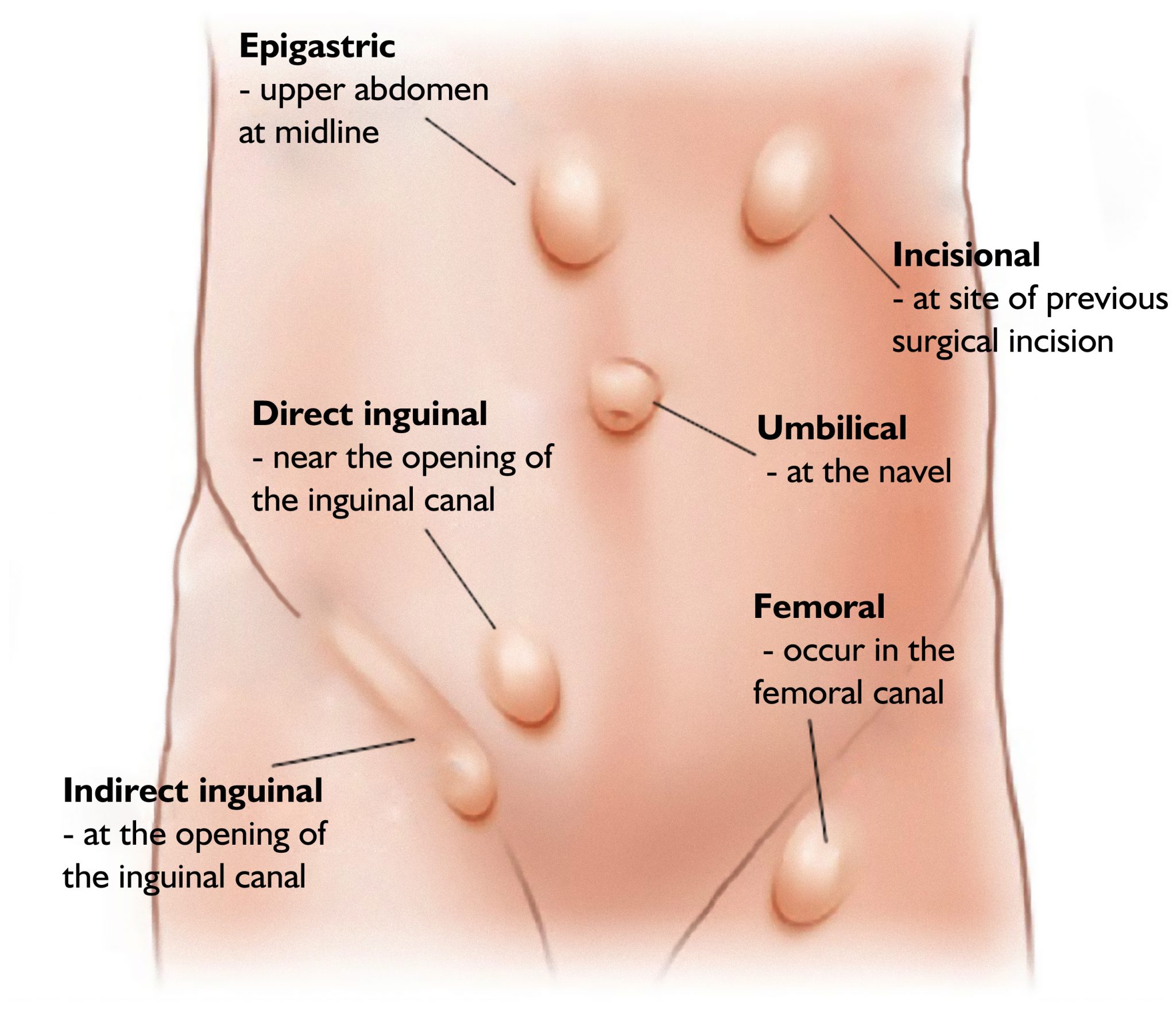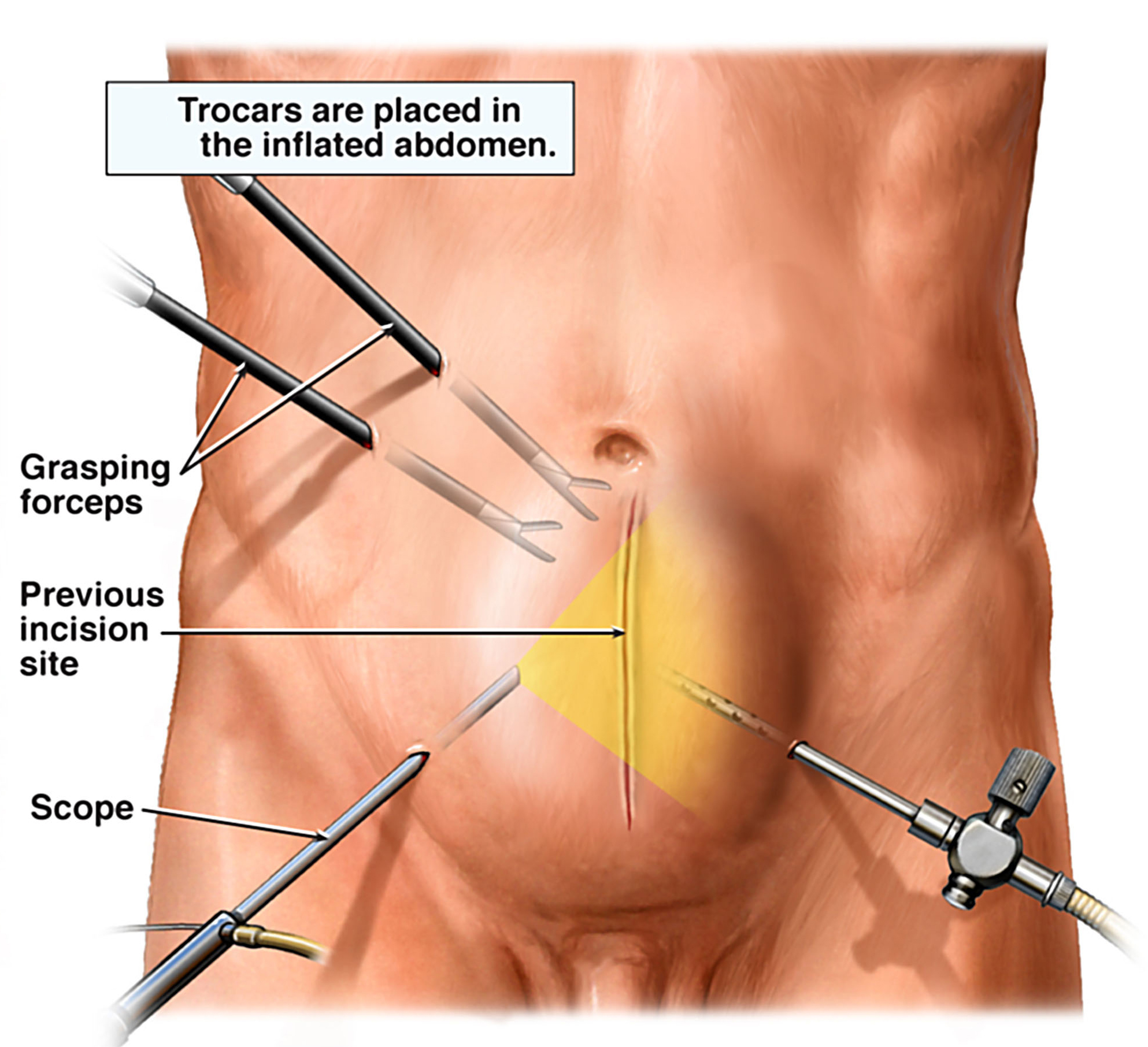Hernia surgery
What is a hernia?
Hernia develops when an internal organ (such as a small section of the bowel) comes out of the cavity in which it is normally located.
The combined cause of each hernia is pressure and the opening or weakness of a muscle or fascia (the strong connective tissue that covers the muscle tissue); the pressure pushes the organ or tissue through the opening or the weak point.
Most hernias are not life-threatening, but they do not go away on their own, so surgery may be needed to prevent more serious complications.
What are the different types of hernias?
There are many types of hernias. The most affected is the abdomen and the groin.

Inguinal hernia
Inguinal hernia is the most common type of hernia in adults. Hernia inguinalis, better known as inguinal hernia, is more common in men, but can also affect women.
In case of an inguinal hernia, the abdominal contents, most often the small intestine or the omentum (the layer of fat covering the human abdominal cavity) protrude through the hernia, resulting in a bulge or visible protrusion.
Femoral hernia
The femoral hernia is a relatively rare type, accounting for only 3% of hernias. While femoral hernia can occur in both men and women, it almost without exception develops in women due to the wider bones of the female pelvis. Femoral hernia is more common in adults than in children.
Epigastric hernia
Epigastric hernia occurs when, due to the weakness of the abdominal muscles, the abdominal tissues can protrude through the muscle. Gastric hernia is similar to umbilical hernia, except that the umbilical hernia develops around the navel, while the gastric hernia is usually between the navel and the chest.

Umbilical hernia
Umbilical hernia occurs in the umbilicus or around the umbilicus. The umbilicus is an inherently weaker area of the abdominal wall, probably because the umbilical cord started from here in the uterus. The aponeurosis layer of the abdominal wall may become thinner, leading to the formation of a cavity (hernia) in the abdominal wall.
Hydrocele
Hydrocele is actually a urological disease that involves fluid build-up around the testicles. Hydrocele develops because the fluid produced by the tunica vaginalis accumulates between the testicles and the tunica vaginalis, thereby increasing the size of the testicles. The cause is usually some form of scarring or inflammation and is a common complication of testicular varicose vein surgery. Hydrocele surgery is the solution to the problem in most cases because there is little chance of recurrence.
What are the symptoms of a hernia?
A hernia most often develops in the abdomen when a weakness in the abdominal wall develops into a localized opening or “defect” through which adipose tissue or the abdominal organs covered by the peritoneum can protrude.
Risk factors for developing a hernia include, but are not limited to smoking, chronic obstructive pulmonary disease, obesity, pregnancy, peritoneal dialysis, collagen vascular disease, and previous open appendectomy (surgical removal of an inflamed appendix). The hernia is partly of genetic origin and is therefore more common in some families.
In most cases, the hernia can be diagnosed based on the symptoms. However, a medical imaging procedure may be used to confirm the diagnosis or rule out other possible causes.

If the hernia is growing or causing pain, your doctor may decide that a surgical procedure is needed. Surgery is recommended for certain types of hernias to prevent complications such as intestinal obstruction or necrosis.
Most abdominal hernias (umbilical hernia, inguinal hernia) can be treated surgically. The healing time after hernia surgery is shorter with laparoscopic surgery.
Open hernia surgery
During open hernia surgery, a net is used to treat the weakness. Open surgery requires a longer healing process and may take up to a month and a half for the patient to move without difficulty.
Laparoscopic hernia surgery
During laparoscopic hernia surgery, the hernia is treated using a tiny camera and a miniaturized surgical instrument, using only a few tiny incisions.
In our hospital, the specialist considers the severity of the hernia when choosing the procedure for inguinal hernia surgery and umbilical hernia surgery.
What are the advantages and risks of surgery?
The main goal of the surgeon is to cure the hernia with minimal surgical and post-operative discomfort and to ensure effective treatment. The surgical technique of hernia has evolved a lot in recent years, the evidence of which is low recurrence rate.
Nowadays, most patients who have undergone hernia surgery can return to their normal activities within a few weeks after surgery, in some cases within a few days.
Complications of hernia surgery include pain lasting more than three months, surgical wound infection, nervous and vascular injuries, and damage to surrounding organs and recurrence of the hernia. Such cases occur in a negligible percentage of surgeries.
Am I fit for hernia surgery?
The hernia surgery begins with a consultation in our private hospital, where the doctor will determine the severity of the hernia and how the hernia surgery will be performed.
It is important to recognize the early symptoms of a hernia in time. An untreated hernia will not go away on its own and may put too much pressure on the surrounding tissues, causing swelling and pain in the surrounding areas.
If blood flow in the trapped intestinal tract is inadequate, incarceration occurs. This can cause the intestinal tissue to become infected or die. An incarcerated hernia is life-threatening and requires immediate medical attention.
How do I prepare for surgery?
It is important that you tell your doctor in advance about any medical information, including any non-steroidal anti-inflammatory drugs (NSAIDs), aspirin or ibuprofen you are taking.
Before surgery, be sure to follow the restrictions prescribed by your surgeon. Do not take NSAIDs one week before the surgery, and do not eat on the day of surgery.
If the intervention requires a hospital stay, be sure to bring everything with you that you will need during this time.
What to do after hernia surgery?
After returning home following the surgery, follow your surgeon’s instructions on when you can return to your normal daily activities.
The degree of pain and/or discomfort you experience depends on the location of the hernia, the type of the surgery, and your individual pain tolerance.
Walking and climbing stairs can be difficult for a few more days.

When to go for a follow-up examination after hernia surgery?
7-10 days after surgery, all stitches will be removed and your healing process will be monitored.
What is included in the price of hernia surgery at Medicover Hospital?
The price of the inguinal hernia surgery and the price of the umbilical hernia surgery include the cost of the surgery as well as the cost of hospital stay and post-operative follow-up examination after surgery.
The fee of the preliminary specialist consultation and the pre-operative examinations is not part of the surgical fee, please inquire about the cost of these from our Customer Service.
What is included in the price of our surgeries?
- costs of the surgery
- costs of anesthesia (local or general anesthesia, postoperative pain relief)
- the costs of the planned hospital stay and care
- necessary medicines and certain medical aids during the stay
- inpatient physiotherapy treatment (if necessary for rehabilitation)
- if necessary, the fee for the planned histological examination
- the price of the first follow-up examination
What additional costs might be expected?
- implants
- consultation with the anesthesiologist (must be done in Medicover)
- pre-operative examinations (if performed by us)
- in case of blood group antibody positivity, the blood matching fee
- hotel service fee for extra care days
- aids for further rehabilitation
- accompanying person staying in the hospital
- day (with one meal) 20 000 HUF
- night (full board) 60 000 HUF
- furthermore, if necessary, the cost of the 2nd follow-up examination is the fee of the specialist examination -50%, the cost of the 3rd follow-up examination is the fee of the specialist examination -30%
The course of the surgery
Before surgery
- pre-surgery specialist consultation, where the specific surgical proposal is made
- consultation with the Case Manager
- general information if necessary
- preparation of a written quotation
- booking surgery and preliminary examination appointments
- payment
-
carrying out pre-operative examinations
-
arrival for surgery
On the day of surgery
- arrival at Medicover Hospital at 6:30
- check-in at the reception on the ground floor
- occupying a room accompanied by a nurse, who provides information
- morning visit with the specialist physician and anesthesiologist
- surgery
- postoperative monitoring
- afternoon visit with the specialist physician
- constant anesthesiology specialist monitoring in the postoperative period
- discharge (with an accompanying person), final report and handing over a certificate
Surgical service process
- surgery
- hospital stay and care
- planned histology
- follow-up examination, sutur removal
